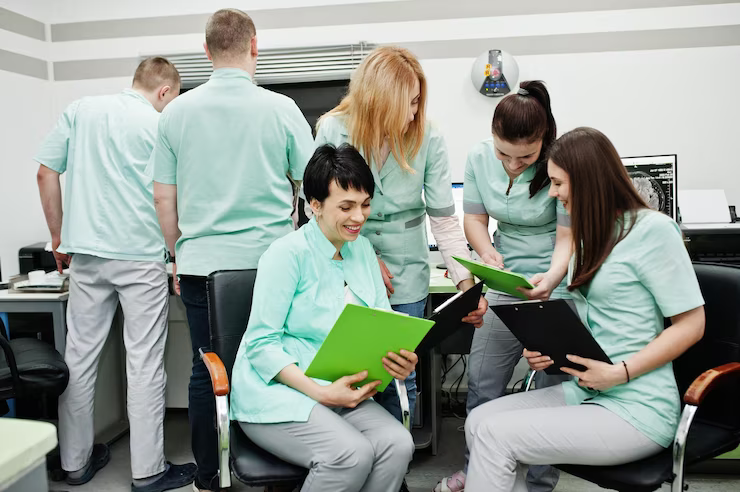
-
Posted on 11th September, 2023
There are numerous specialities in the healthcare sector that you as a nurse can specialise in. Perioperative nursing is one such specialty that focuses on caring for patients before, during, and following surgical procedures. Scrub nurses, circulation nurses, and nurse anaesthetists are the three main subspecialties of perioperative nursing.
In this blog we will examine each of these specialisations in depth and highlight their crucial duties and roles that each carry out.
The Surgical Experts: Scrub Nurses
Surgical technologists, sometimes referred to as scrub nurses, are the foundation of any operating room. They collaborate closely with the surgeon and provide hands-on support during surgeries. These trained nurses are extremely knowledgeable and skilled in a wide range of surgical methods, tools, and procedures. Their main duty is to prepare the sterile field and make sure that all required tools and equipment are in working order. Scrub nurses must have remarkable hand-eye coordination and efficiency to perform the crucial role of passing instruments to the surgeon during surgery.
Scrub nurses frequently focus on particular branches of surgery. For instance, a scrub nurse with significant training in neurosurgery would be familiar with all the relevant instruments and techniques. Scrub nurses are crucial team members that make a big difference in how successfully surgical interventions go.
Circulating Nurses: The Patient Advocates
Throughout the surgical procedure, circulating nurses are essential in maintaining the safety and comfort of the patient. They assume responsibility for chores before, during, and following surgery in order to advocate for the patient’s requirements and overall wellbeing. Assuring that patients are suitably ready for the surgery; these nurses are involved in the pre-operative stage. They authenticate patient IDs, verify the surgical site, and the readiness of the operating room.
Circulating nurses keep an eye on the patient’s vital signs while the surgery is being performed, document the procedure and promote efficient teamwork. They are in charge of making sure the required tools and materials are available. A smooth and secure experience for the patient is made possible by the role of circulating nurses as a link between them and the rest of the surgical team.
Nurse Anaesthetists: Experts of Anaesthesia
Specialised nurses known as nurse anaesthetists give anaesthesia to patients before and during surgical procedures. Nurse anaesthetists collaborate closely with anaesthesiologists to create individualised anaesthesia programs for patients thanks to their advanced training and proficiency in anaesthetic drugs. Their main responsibility is to protect the patient when administering anaesthetics and to keep an eye on their vital signs throughout the treatment.
The effects and potential hazards of anaesthesia on the body must be thoroughly understood by nurse anaesthetists. To ensure the patient is at ease and stable throughout the procedure, they adjust the anaesthetic dosage as necessary. Nurse anaesthetists may also offer post-operative pain management treatments in addition to their work during the surgery, assuring the patient’s comfort and a speedy recovery.
Conclusion
As we have read above, there are a wide variety of specialisations in the field of perioperative nursing. Each with specific duties and areas of competence. The effectiveness and safety of surgical procedures are considerably aided by scrub nurses, circulating nurses, and nurse anaesthetists. They are essential members of the perioperative healthcare team because of their specific knowledge, abilities, and commitment. These nurses give patients great care before, during, and after surgery thanks to their unshakable dedication and knowledge, assuring the best possible results in the operating room. If you want to take up a nursing career in the perioperative field, you should enrol for IHM’s Certificate in perioperative nursing. Get in touch with us at IHM for more details.
FAQ’s
If you interested in becoming a nurse anaesthetist you need to have a Bachelor of Science in Nursing (BSN) degree, a valid registered nurse (RN) license and substantial clinical experience in critical care settings.
Yes, nurse anaesthetists face several challenges while managing patients’ anaesthesia while the surgery is in progress. They handle emergencies and ensure patient safety. There are various risks involved while administering anaesthesia, the patients are closely monitored, and response to any complications are done swiftly.
Principal duties of circulating nurses include:
Strong critical thinking abilities, meticulousness, and the capacity to function well under pressure are requirements for nurse anaesthetists. Since they interact often with patients, surgeons, and other medical professionals, they should have great interpersonal and communication skills. Additionally, maintaining composure and being cool under pressure is essential.

